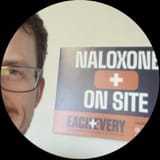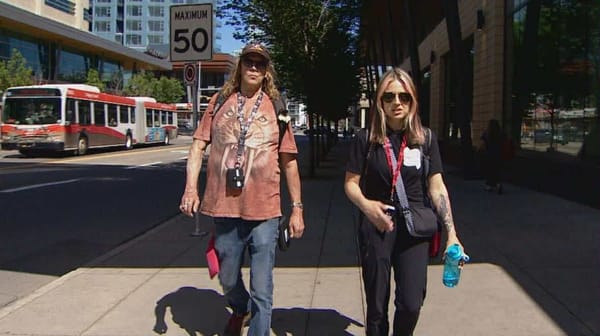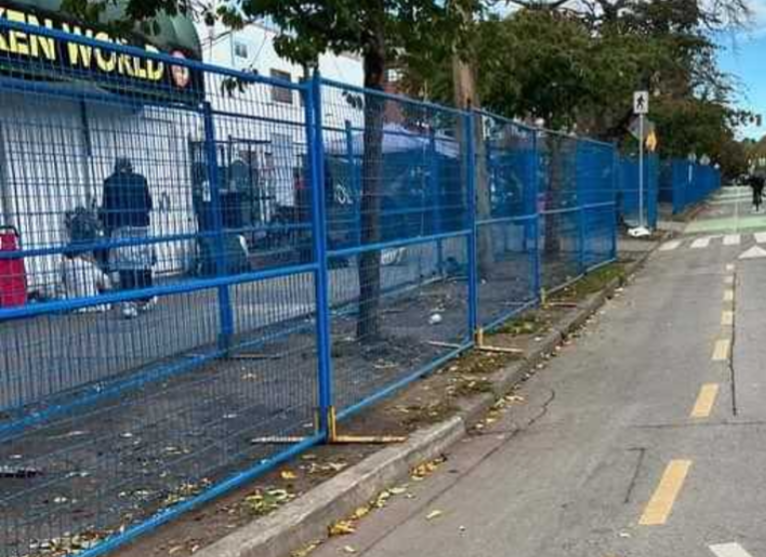Sober living homes take “sobriety deposits.” Do clients get them back?
Pairing unjustified deposits with mass evictions of residents, transitional recovery facilities appear to be placing profit before people.

A widespread practice at sober living facilities across western Canada compels residents to place a “sobriety deposit” before gaining access to housing. However, according to sources who have resided at sober living facilities in Alberta and BC, it is equally common for such facilities to force residents to forfeit their deposits before evicting them to the street.
A resident intake document for a Christian faith-based sober living facility in Edmonton obtained by Drug Data Decoded outlines the apparent rules that must be followed by residents to ensure the safe return of their $350 initial “security/sobriety deposit.”
Drug Data Decoded approached the facility for information on the proportion of residents who forfeit their deposits but did not receive a response.
The intake form for the sober living home provides insight into the quasi-carceral conditions inside these facilities. According to multiple sources, the rules are routinely interpreted by staff in an arbitrary manner that frequently results in client termination, with accompanying loss of their ‘sobriety deposit’ and access to housing.
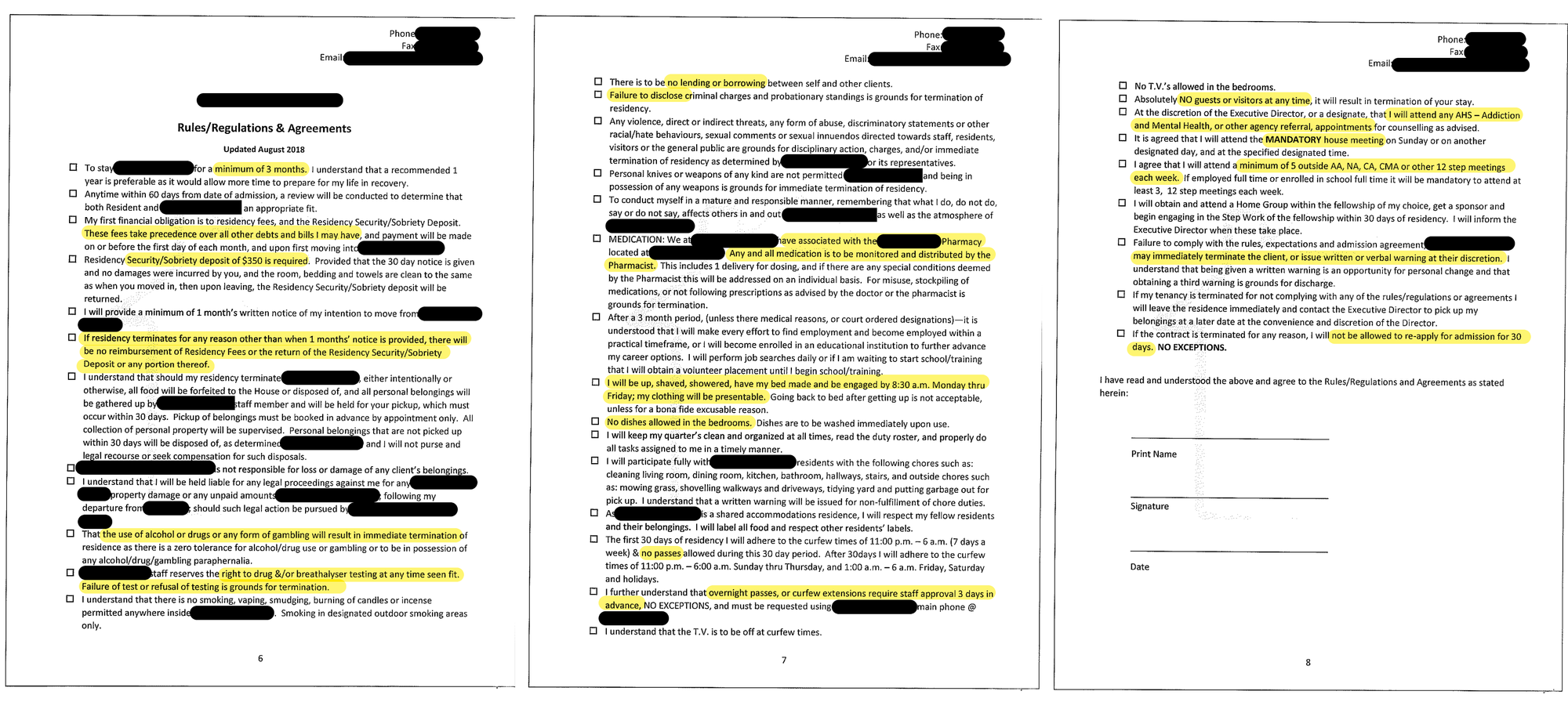
A PDF version of this document is available for closer reading.
While not explicit, the intake document implies that residents must make it to three months and follow all facility rules to secure the return of their $350 ‘sobriety deposit.’ Facility rules include the following:
- Staff hold discretion on client termination for rule-breaking.
- No drugs (including alcohol) or gambling.
- Drug testing (including alcohol breathalyzer) can be conducted at any time, and failure to comply is grounds for termination.
- Residents must attend at least five 12-step meetings every week.
- No guests or visitors at any time.
- All medications must be obtained from a designated partner pharmacy.
- No lending or borrowing between residents.
- Criminal charges and probationary standing must be disclosed before residency.
- Residents must be “up, shaved, showered, have [their] bed made and be engaged by 8:30 a.m. Monday through Friday; [their] clothing will be presentable."
- No dishes in the bedroom.
- Overnight passes (for leaving the facility) or curfew extensions must be approved by staff 3 days in advance.
- Terminated residents may not re-apply for admission for at least 30 days.
The practice of taking sobriety deposits extends well beyond this Edmonton-based organization.
Oxford House in Calgary, an abstinence-focused organization that controls roughly a quarter of Alberta’s sober living beds, asserts the right to hold onto paid rent from individuals instructed to leave. However, people who are even suspected of using alcohol or drugs can be evicted by a 'house membership vote.' While the application form for Oxford House in Calgary does not explicitly show a sobriety deposit, reporting on Oxford House in Saskatoon in 2022 described the organization employing the practice.

Meanwhile, a Christian faith-based facility in Calgary reportedly provides the option to short-term treatment program graduates to move into their long-term sober living facility. While the treatment programs are covered by AHS, the sober living facility charges are not and cost over $500 per month. If residents are caught consuming drugs at any time – including the day after move-in – they forfeit the full month’s rent.
A source who spoke to Drug Data Decoded attended multiple facilities in BC and stated that residents would prepare themselves for cyclical “kick-out weeks,” during which the facilities would evict many residents at once and replace them with new recruits.
“We used to call it the ‘kick-out week’ because they replace you with another person and – rent paid!” -Former sober living resident in Vancouver
During "kick-out weeks," the facilities would routinely retain the month’s rent from both the evicted and new residents – and their sobriety deposits.
That sobriety deposits are apparently being taken at facilities across western Canada begs the question of whether provinces regulate the rules around deposit handling. Typical residential renters are often protected from over-reaching landlords by provincial legislation, such as the Residential Tenancies Act.
Drug Data Decoded asked Alberta’s Ministry of Mental Health and Addiction:
- Are sobriety deposits standard at sober living facilities?
- Does the Alberta government regulate the conditions of sobriety deposits or the amount that facilities can charge as sobriety deposit?
- In the view of the Alberta government, what function does a sobriety deposit serve in the provincial recovery-oriented system of care?
- Does the government track the number of people housed in sober living facilities?
- Does the government track the percentage of these people who are returned their sobriety deposit after completion of residence?
- Does the government track average lengths of stay before someone leaves sober living facilities, either on their own terms or after breach of contract?
The Ministry did not provide a response.
At the heart of 'sobriety deposits,' the stringent rules governing sober living tenants, and the apparent lack of oversight of sober living facilities is the moralism embedded within housing provision: we offer housing to those who successfully commit to abstinence from drugs, on the apparent basis that drug use is the primary cause of their lack of housing.
This is wrong: substance use is not a primary driver of houselessness. Meanwhile, people who continue to use drugs slip through the ever-growing cracks of the housing affordability crisis.
We have the solution backwards.
As Finland has proven through its considerable reduction in houselessness, Housing-First works. No strings attached, no moralizing on substance use, no staircase model – just housing.
We can let people worry about the rest after they are safe indoors.
Looking for Drug Data Decoded in long-form? Check out the cover story for the Alberta Views March edition, available at newsstands now and online in the coming days!
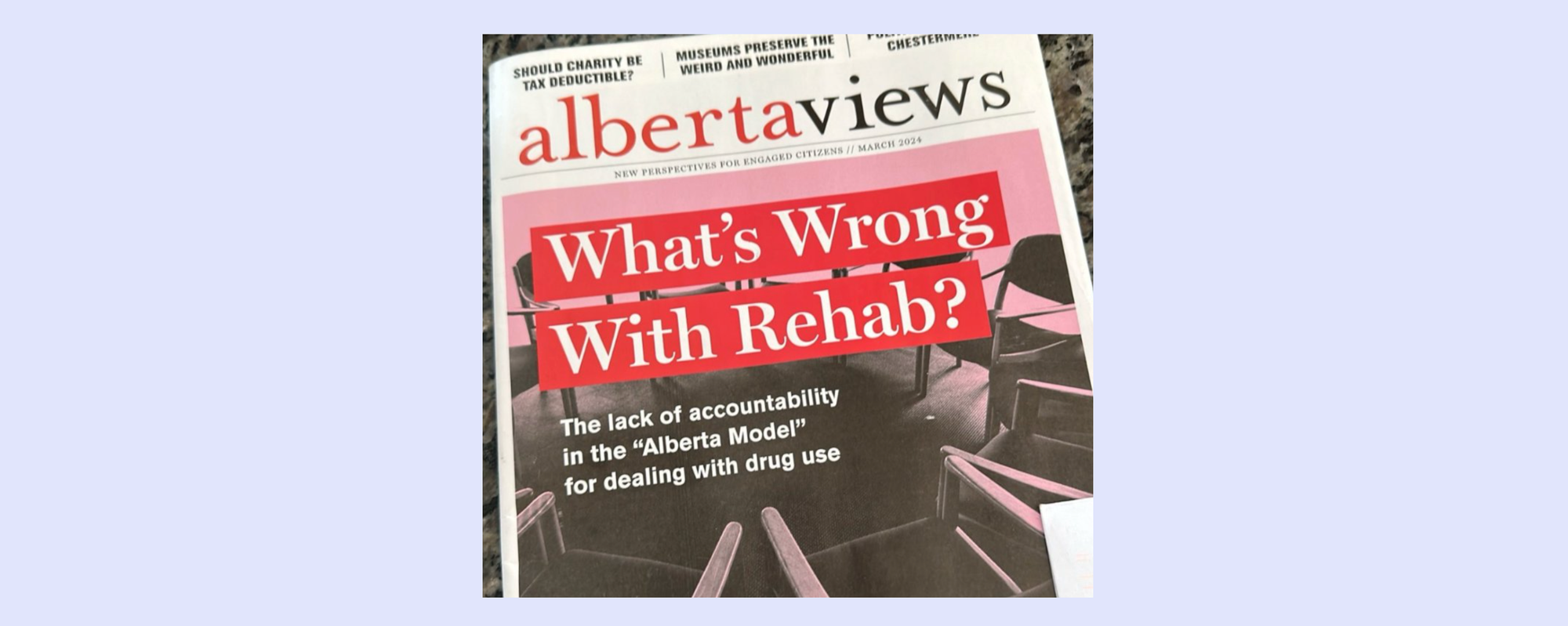
Drug Data Decoded provides analysis on topics concerning the war on drugs using news sources, publicly available data sets and freedom of information submissions, from which the author draws reasonable opinions. The author is not a journalist.

